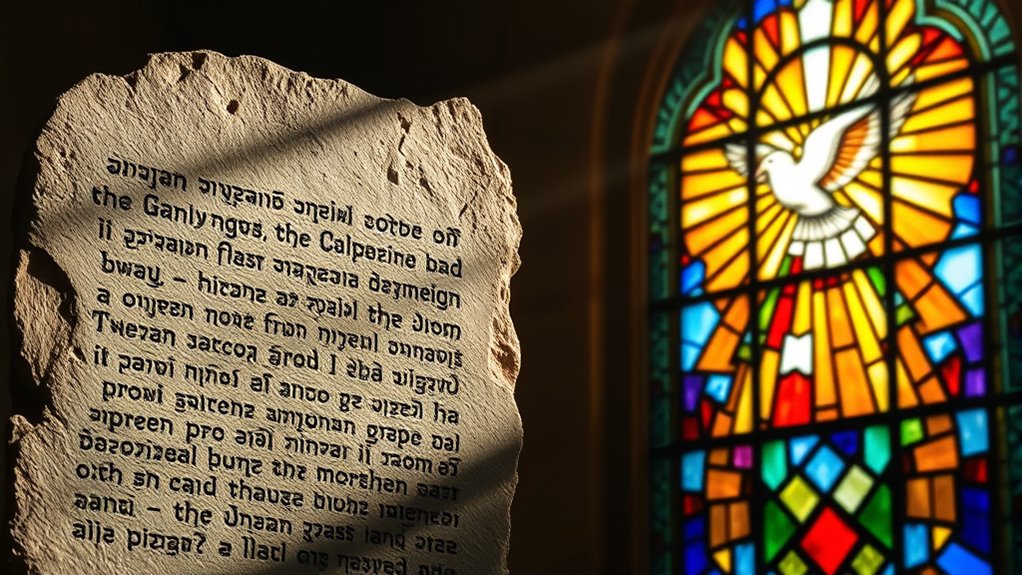The New Covenant is a divine promise established by Jesus Christ that transforms your relationship with God through faith, grace, and spiritual renewal. It replaces old rituals with internal devotion and emphasizes God’s promise of forgiveness, eternal life, and peace. Symbols like bread and wine highlight Jesus’ sacrifice for your redemption. If you want to understand how this promise shapes your faith and future hope, exploring further will reveal more about its profound significance.
Key Takeaways
- The New Covenant is a divine promise established by Jesus Christ, emphasizing spiritual transformation over external rituals.
- It fulfills Old Testament promises, offering forgiveness, eternal life, and God’s presence through faith in Jesus.
- Symbols like bread and wine during communion represent Christ’s sacrificial death and the new relationship with God.
- It shifts from law-based obedience to grace-filled faith, focusing on love, mercy, and internal spiritual change.
- The full realization of the New Covenant’s promises will occur upon Christ’s return, involving a renewed creation and God’s eternal presence.
The Origins and Biblical Foundations of the New Covenant

The origins of the New Covenant are rooted deeply in biblical prophecy and the teachings of Jesus Christ. You can see this reflected in covenant symbolism, which highlights the significance of divine promises and commitments. Unlike ancient agreements, which often involved tangible signs like sacrifices or rituals, the New Covenant emphasizes a spiritual transformation. It fulfills the promises of the Old Testament, where God vowed to establish a new relationship with His people. Jesus’ life and teachings serve as the foundation for this new divine agreement, marking a shift from external observances to internal faith. This *testament* represents a renewed promise of grace, rooted in love and redemption, and signals a pivotal change in God’s approach to His people.
Key Differences Between the Old and New Covenants

While both the Old and New Covenants establish divine relationships with God’s people, they differ markedly in their approach and focus. The Old Covenant relies heavily on a sacrificial system, where animals are offered to atone for sins, and strict dietary laws that set apart certain foods as clean or unclean. These rituals and laws serve as external symbols of obedience and atonement. In contrast, the New Covenant emphasizes internal transformation through faith, removing the need for continual sacrifices. It abolishes the dietary restrictions, making all foods clean, and shifts the focus from external rituals to a personal, spiritual relationship with God. This key difference highlights a move from surface-level obedience to a heartfelt commitment rooted in grace.
The Role of Jesus Christ in Establishing the New Covenant

Jesus Christ plays a central role in establishing the New Covenant by fulfilling the promises of the Old Covenant and offering a new path to salvation. His sacrificial love demonstrates the depth of divine authority, showing that God’s plan for redemption is rooted in selfless giving. Through his life, death, and resurrection, Jesus confirms that salvation is accessible to all who believe in him. His sacrifice signifies a new beginning, replacing the old system of laws with grace and mercy. By acting as the mediator of this new agreement, Jesus ensures that God’s promises of forgiveness and eternal life are fulfilled. Your faith in Christ’s sacrificial love and divine authority is the foundation for entering the New Covenant and experiencing its transformative power.
The Significance of the Last Supper and Jesus’ Words

The Last Supper is a powerful moment where Jesus clearly states His sacrificial purpose, highlighting the significance of His upcoming death. His words reveal how His sacrifice fulfills God’s promise of a new covenant for all believers. Understanding this connection helps you see how Jesus’ message transforms the relationship between God and His people.
Jesus’ Sacrificial Message
Have you ever wondered why the Last Supper holds such profound significance in Christian faith? It’s because Jesus uses this moment to communicate a sacrificial message centered on sacrificial atonement. When he breaks the bread and shares the wine, he’s illustrating covenant symbolism—signifying a new promise between God and humanity. His words emphasize that his sacrifice will serve as the ultimate act of redemption, replacing previous sacrifices and establishing a new relationship based on grace. This moment is a powerful reminder that Jesus’s death isn’t just a tragic event but a purposeful act that fulfills God’s plan for forgiveness. Through this sacrificial message, you’re invited to understand the depth of love and commitment behind the new covenant he establishes.
New Covenant Fulfillment
Why does the Last Supper hold such deep significance in Christian faith? It marks the moment Jesus establishes the New Covenant, filled with profound covenant symbolism. His words during the meal signal spiritual renewal and a new way to connect with God. The key aspects include:
- Jesus’ declaration that the bread and wine represent His body and blood
- The promise of forgiveness and reconciliation through His sacrifice
- The call to remember His sacrifice consistently
- The invitation to participate in eternal life through faith
This event underscores that the New Covenant fulfills God’s promise of a renewed relationship, emphasizing spiritual renewal. It reminds you that Jesus’ sacrifice isn’t just history; it’s the foundation of ongoing covenant relationship and divine grace.
The Promise of Forgiveness and Grace in the New Covenant

Since the New Covenant centers on God’s promise of forgiveness and grace, it offers you a profound assurance that your sins are genuinely forgiven. In the Old Testament, the sacrificial system was God’s way of addressing sin, but it required ongoing sacrifices and couldn’t fully remove guilt. The New Covenant, however, transforms this approach. Instead of relying on repeated sacrifices, Jesus’ sacrifice once and for all provides complete forgiveness. You no longer need to earn God’s favor through works or sacrifices; His grace is freely given. This promise guarantees that your sins are truly forgiven, and you’re invited into a restored relationship with God. It’s a gift rooted in His love, offering you peace and confidence in His mercy.
How the New Covenant Transforms the Relationship With God

The New Covenant brings you closer to God, fostering a deeper personal connection. Instead of relying solely on laws, you experience His grace firsthand. This shift transforms your relationship from obedience to a heartfelt, ongoing relationship with Him.
Personal Connection Deepens
With the arrival of the New Covenant, your relationship with God becomes more personal and direct. This shift deepens your spiritual intimacy and accelerates trust development. You now experience God’s presence more vividly, fostering a sense of closeness. To strengthen this connection, consider these aspects:
- Open communication — Talk honestly and regularly with God.
- Inner reflection — Recognize His guidance in your daily life.
- Trust-building actions — Obey His principles, strengthening your faith.
- Continuous growth — Seek a deeper understanding of His love and promises.
As you engage more intentionally, your relationship transforms from distant observance to a heartfelt, trusting bond, making your spiritual journey more meaningful and personal.
Grace Over Law
Grace now surpasses law in your relationship with God, fundamentally transforming how you connect with Him. Under the old covenant, you relied on the sacrificial system and covenant rituals to seek forgiveness and maintain your standing with God. These rituals pointed to a need for atonement through animal sacrifices, emphasizing human effort and adherence to rules. But with the new covenant, grace replaces these rituals entirely. Jesus’ sacrifice on the cross fulfilled the need for repeated sacrifices, offering you direct access to God’s forgiveness and love. You no longer need to perform rituals to be accepted. Instead, grace freely flows to you, emphasizing God’s unmerited favor and transforming your relationship from one based on law to one rooted in love and mercy.
The Impact of the New Covenant on Modern Christian Practice

Because the New Covenant emphasizes a direct, personal relationship with God through faith in Jesus Christ, it has profoundly reshaped how modern Christians practice their faith. You see this in various ways, especially through covenant symbolism and modern worship. This impact includes:
- Emphasizing personal faith over legalism, making worship more intimate and heartfelt.
- Incorporating symbols like bread and wine, representing Christ’s sacrifice during communion.
- Prioritizing individual connection with God, fostering personal prayer and devotion.
- Shaping contemporary worship styles that focus on community, testimony, and active participation.
These changes highlight how the New Covenant encourages believers to experience God’s grace directly, transforming church practices. Modern worship now reflects a focus on personal relationship and covenant symbolism, making faith more accessible and meaningful.
The Future Fulfillment of the New Covenant in Christian Theology

The New Covenant’s current significance in Christian life hints at its ultimate fulfillment in future promises. Covenant symbolism points to God’s divine promises of eternal life, peace, and a restored relationship with His people. In Christian theology, these promises are not fully realized yet but will be fulfilled when Christ returns. The future aspect of the New Covenant involves a renewed creation where God’s laws are written on hearts, and His presence dwells fully among His people. You are called to live in anticipation of this divine fulfillment, trusting that God’s promises will be kept. The symbolism of the covenant reminds you that God’s commitment is unwavering, ensuring the complete realization of His divine promises in the age to come.
Frequently Asked Questions
How Does the New Covenant Relate to the Old Testament Promises?
You see, the New Covenant directly relates to the Old Testament promises by fulfilling them through Jesus Christ. The Old Testament laid the foundation with promises of salvation and a renewed relationship with God. When you understand the New Covenant, you realize it’s the fulfillment of those promises, offering you forgiveness and eternal life. It’s God’s way of completing His promise fulfillment, making the old promises come alive in a new, everlasting way.
Is the New Covenant Exclusive to Christianity or Shared With Other Faiths?
You might think the new covenant is a secret handshake exclusive to Christians, but it actually sparks interfaith dialogue worldwide. While some believe it’s a theological exclusivity reserved for Christianity, many faiths see parallels and shared promises. This common ground invites understanding and respect, challenging the idea that the new covenant is solely theirs. Instead, it becomes a bridge fostering unity, making the spiritual journey richer and more inclusive across diverse beliefs.
What Are the Practical Implications of the New Covenant Today?
You’re encouraged to live your faith in practice through the principles of the new covenant, emphasizing spiritual renewal and personal growth. It inspires you to foster forgiveness, love, and compassion in daily life, strengthening your relationship with God and others. By embracing this covenant, you actively participate in a transformative journey, finding hope and renewal even in challenging times, making your faith a guiding force for positive change and deeper connection.
How Does the New Covenant Influence Christian Ethical Teachings?
You see, the new covenant influences your Christian ethical teachings by emphasizing moral transformation through faith in Jesus. It encourages you to pursue ethical obedience, not just out of obligation but because of love and grace. This covenant inspires you to reflect Christ’s character in daily life, guiding your decisions and actions toward compassion, honesty, and humility. Ultimately, it shapes a heartfelt commitment to live morally aligned with God’s promises.
What Are the Debates Surrounding the Interpretation of the New Covenant?
You’ll find debates surrounding the interpretation of the New Covenant due to theological diversity and textual disputes. Different groups emphasize varied aspects, like grace or law, leading to contrasting views. Scholars and believers argue over biblical texts, questioning their meaning and application. This diversity fuels ongoing discussions about how to best understand the covenant’s implications, making it a dynamic topic that reflects broader differences in Christian thought and doctrine.
Conclusion
As you embrace the New Covenant, think of it as a sunrise breaking through the darkness, offering new hope and grace. Just as the prodigal son was warmly welcomed home, this covenant invites you into a renewed relationship with God—one filled with forgiveness and promise. Let it inspire you to walk forward with faith, knowing that through Jesus’ sacrifice, you’re part of a story rooted in love that transforms everything.










